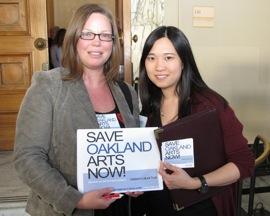A crisis of potentially catastrophic proportions threatens arts and library programs and the very quality of life in Oakland. With a projected city budget deficit of $58 million for years 2011–2013, Oakland Mayor Jean Quan and the eight-person City Council are struggling with ways to reduce staff, find new revenues, restructure city departments, prioritize services, and eliminate programs.
Although the City Council will have the final say, former City Council member Quan has proposed three possible budget scenarios. Even the mildest of these would be devastating to the arts.
The worst budget scenario in the mayor’s proposal, so-called Scenario A, would make huge cuts to the General Fund, which comprises 42 percent of the city’s total budget. Of the current $925,000 the city allocates to the arts, a whopping $725,000 would be eliminated.
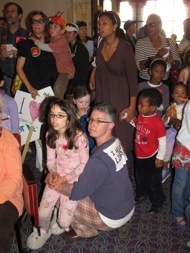
Photos by Jason Victor Serinus
For classical music organizations — including the Oakland East Bay Symphony (plus the Oakland Symphony Chorus and the Oakland Youth Orchestra), Cantare Con Vivo, Bay Area Classical Harmonies, Oakland Opera Theater, Opera Piccola, and the Purple Silk Orchestra — the cuts would be disastrous. For a city in which every $1 invested in the arts brings back $4 in fees, licenses, and taxes, such cuts would be tantamount to financial suicide. As for the Oakland Public Library system, which contains a large collection of music scores, sheet music, CDs, and the like, the cuts would close 14 out of 18 libraries and leave the main library open for limited hours two or three days a week while offering only restricted services. For the legions of cultural youth outreach programs that are so essential in one of America’s most racially diverse, economically challenged cities, these arts cuts would go a long way toward dooming yet another generation of youth.
No one knows what will happen. Because the members of the City Council have not finished contemplating the mayor’s budget and formulating proposals of their own, possible alternatives to her three scenarios will first be presented and discussed at the June 21 City Council meeting. Then, the Council has until June 30 to finalize the budget. That’s not much time.
Calls and emails to City Council members and the mayor are essential. Equally important is a strong turnout at the June 21 City Council meeting. Impassioned pleas from hundreds of concerned citizens, musicians, artists of every stripe, educators, and library users will be crucial to the final outcome.
The Oakland Cultural Trust’s Arts Actions
To advocate for an equitable distribution of cuts across all organizations, rather than unduly penalize those devoted to the arts, the Oakland Cultural Trust has swung into action. Directed by Margo Dunlap, the Trust is an association of artists, arts organizations, and others who are committed to policies and activities that support artists, the arts community, and nonprofit arts organizations.
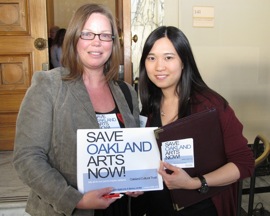
The Trust has organized a series of “Arts Actions” at City Council meetings. Publicized on its Web site and via e-mail blasts, the latest Arts Action helped pack the floor and balcony of Oakland City Hall during the June 7 City Council meeting, which began shortly before 6 p.m.
Speakers had two opportunities to address the Council: during Open Forum, and after a scheduled discussion of the budget for the Oakland Redevelopment Division of CEDA, the Community and Economic Development Agency. The first 15 people to sign up for Open Forum were magnanimously given opportunities to speak for 1 minute each at the start of the meeting; the rest were invited to stay around (for many hours) to speak at meeting’s end.
In addition, eight speakers signed up to speak when the Oakland Redevelopment Division’s budget came up for discussion. During the recent tenure of Mayor Ron Dellums, funding for Oakland’s Arts and Marketing Division was moved from the City Administrator’s Office to the Redevelopment Division. Given that so much redevelopment money comes from state funds, which would be severely cut under Gov. Jerry Brown’s budget proposals, Oakland stands to lose both arts dollars and affordable housing.
Margo Dunlap, executive director, Pro Arts and director of the Oakland Cultural Trust; Barbara Johnson, StageBridge; Michael Fried, Contare Con Vivo; Judy Smith, Axis Dance; Reginald Ray Savage, Savage Dance; Helen Stoltzfus, Alice Arts Center; and Amana Harris, Attitudinal Healing Connection were among those who delivered passionate pleas for the arts. Other speakers, whose names were hard to catch as they spoke via the substandard amplification in City Council chambers, included the president of the African-American Museum, a Spanish-speaking volunteer at Peralta Hacienda, and a young boy backed by a large contingent of youth who had participated in a read-out (so to speak), held outside City Hall before the City Council Meeting commenced.
Vivid Testimony Given
During her testimony at the start of the June 7 meeting, Dunlap explained that she works with nearly 1,000 artists a year who serve over 72,000 people. “Oakland has the highest percentage of fine artists in the entire country,” she told Council members and attendees. “There are over 50 organizations and institutions that participate in the Oakland Cultural Trust. The arts are the new brand of Oakland, the new story about Oakland, and a peak driver of Oakland’s Renaissance. We want to safeguard the city’s wise, long-term investment in cultural institutions, and prevent future marginalization of the arts. We advocate for equitable cuts to save Oakland arts programs and maintain momentum for the Oakland Renaissance.”
Dunlap’s message was mild compared to the words that Michael Fried, executive director of Cantare Con Vivo and a member of the Oakland Cultural Trust’s Executive Committee, directed to the Council. “We are all responsible for a very tragic failure of foresight and leadership that is unfolding in our beloved city,” he declared at a May 26 meeting. “Somewhere in the bowels of hell, Hitler and Stalin are laughing at us.
“Hitler burned books, and Stalin sent artists to the Gulag. Next month, the City of Oakland proposes to close most of its libraries, kill its 26-year-old, nationally admired arts funding program and staff, and close parks and recreation centers, while our courageous police and fire department become the guardians of a Blade Runner city in danger of losing the very gifts that make it great. What will our children and youth have to look forward to? Sitting mindlessly in front of television screens and video games while stuffing themselves with diabetes- and obesity-inducing junk food?
“Please have the courage and vision to think outside the Bankrupt Budget A box, Fried asked. “Find a way to invest a modest amount of general fund dollars to keep the cultural arts department alive. A new Oakland Quality of Life Coalition will work with you on creative new ways to augment the City’s Budget to keep our arts, our libraries, our parks and Oakland’s renaissance alive.”
Grim Classical Realities
Fried was painfully aware of what the budget cuts would mean for his organization, Cantare Con Vivo. Thanks to a $19,000 grant from Oakland’s Cultural Funding Program, Fried got the James Irvine Foundation to make a two-year commitment to underwrite Cantare’s program of offering free classical and world music concerts to underserved communities and neighborhoods in Oakland.
Last March, the organization brought its 100-voice symphonic chorale, a paid orchestra, and four soloists from San Francisco Opera to present a free performance of Beethoven’s Missa Solemnis in Allen Temple Baptist Church in the heart of East Oakland’s African-American community. In May, it collaborated with the Oakland Interfaith Gospel Choir to give a free performance of I Too Sing America, a celebration of African-American music. Accompanying the concert was a multivisual exhibit of the history of African-American music at B.B. Memorial Cathedral.
“That’s what a relatively modest amount of money can do for the cultural life of Oakland,” Fried explained by phone. “Our public school programs and 10 teaching artists reach 2,000 children per week. If either Scenario A or B in the Mayor’s budget [takes effect], we will lose all Oakland General Fund dollars for the arts and lose the staff that administers a nationally admired, peer-review cultural funding program based on the NEA model of merit.”
Andrew Chung, founder and principal conductor of Bay Area Classical Harmonies, explained by phone that his organization mounted a production of Mozart’s Le Nozze di Figaro at the Oakland Metro Opera House in 2009, and hopes to present Dido and Aeneas there next spring. More recently, it presented a Beethoven concert in St. Paul Episcopal Church in Oakland.
The organization, which Chung began in 1998 when he was a music student at UC Berkeley, also has two professional choral ensembles, one of which specializes in Armenian and Persian choral music. He is a volunteer; the only people who are paid are the musicians.
“The cuts mean we can no longer look at ambitious projects such as opera in Oakland, which is really unfortunate,” Chung said. “Together with cuts to Oakland Opera Theater, there would no longer be any respectful opera organization in the city. That includes our programs to bring opera education to kids in the Oakland schools.”
Painting the Broad Picture
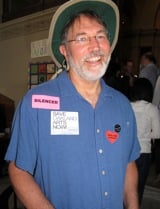
Rae Holzman, an artist and the former program director at the Museum of Children Art, who has recently rejoined the board of Pro Arts, explains that the loss of funds would force the organization to cut back on exhibit programs and youth outreach programs. This includes a youth fellowship program that provides scholarships for summer programs at the Art Institute, plus a mentoring program in which older and more professional artists work with youngsters to improve their art so we will even have artists tomorrow.
“I think most arts organizations are prepared to take some sort of hit,” she explained outside the City Council chambers. “But zero would be deadly. And if there are no arts budget line items this time, what’s going to happen the next time around? We’re going to be forgotten, and that can’t happen.
“The arts represent the culture of everyone. If there are no arts, what’s the point? People need the arts to give them soul sustenance. And as someone who mostly works with children, I know that artists are the inventors and creators of tomorrow. They’re the problem-solvers, the creative thinkers who help move the Earth forward and make a better place by looking at things in new ways and thinking outside the box.
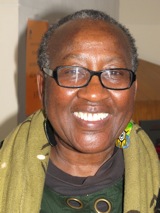
Jim Walker, a psychotherapist in private practice in Oakland and San Francisco, was passing out stickers and leaflets outside City Council chambers. “I’m here because I love all the Oakland libraries and don’t want them to be closed,” he declared. “Where is our heart? The libraries are part of the heart of the city, and should not be cut out.”
Aeesha Clottey, one of the founders of Oakland’s Attitudinal Healing Connection (and a personal mentor of mine), explained that AHC brings arts into the schools and into the community. “We believe that art is everything,” she explained.
“Arts help people learn what it means to be a good neighbor, and help them tap into core values. In our Art Esteem programs, we use art as a transformative intervention tool and strategy for community building, eliminating violence, and creating healthier communities. We want to make sure our young people understand the power of art. Arts give children vision.”
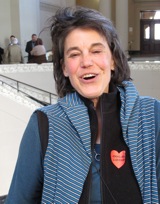
Perhaps the most moving conversation I had at City Council was with Kathleen Denny. Elaborating on testimony she delivered during the Open Forum, she explained that she has spent years reading stories to children ages 3 and 4 through the Books for Wider Horizons program of the Oakland library. (She also told me that she and her husband are planning to attend their first performance of Wagner’s Ring Cycle at San Francisco Opera later this month.)
“I help awaken in kids the beauty of language and story and poetry and music,” she said. “That is what would be chopped. Almost all the children I read to speak Spanish at home. Many of them are just starting preschool and learning English at the same time.
“While I incorporate Spanish into my routines, the music of literature is what matters,” Denny continued.” Often, if a book in English is musical, the children are entranced. This beauty helps motivate people to become proficient in language and possibly someday even write themselves. I use music as well as words, because kids learn through every single part of their body. We sing, we dance, we move — it’s all wrapped up together. Every bit of it is learning.”
Please Do Your Part
The Oakland Cultural Trust Arts Action Web site includes contact information for all Oakland City Council members as well as for Mayor Quan. It also contains a list of strong talking points, as well as information on future actions.
By all means, try to sign up to speak at the City Council meeting on June 21. You can either sign up in person shortly before the meeting begins at 5:30 p.m., or online.
If you’re planning to attend the annual New Music Bay Area Garden of Memory performance extravaganza at Oakland’s Chapel of the Chimes on June 21, contacting Council Members in advance of the meeting is essential. Those unable to attend can watch on computer via Oakland’s KTOP-TV 10 here. Footage is also archived and will be available for viewing shortly after the meeting. At least for now. ... But who knows what will survive the budget cuts?

